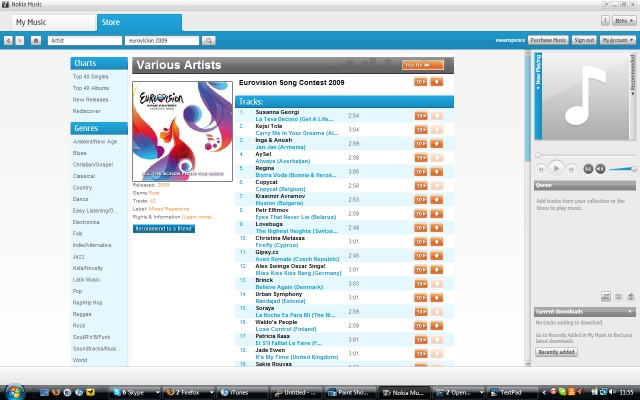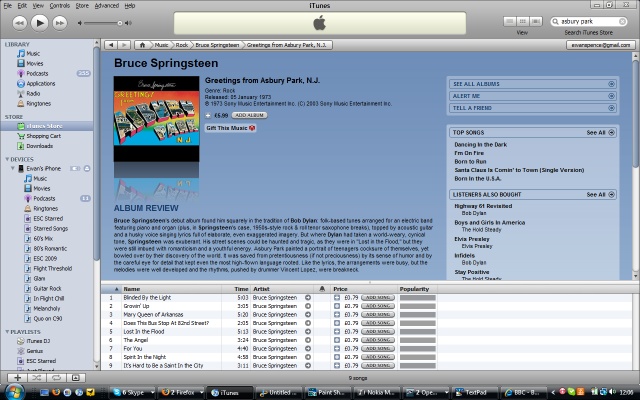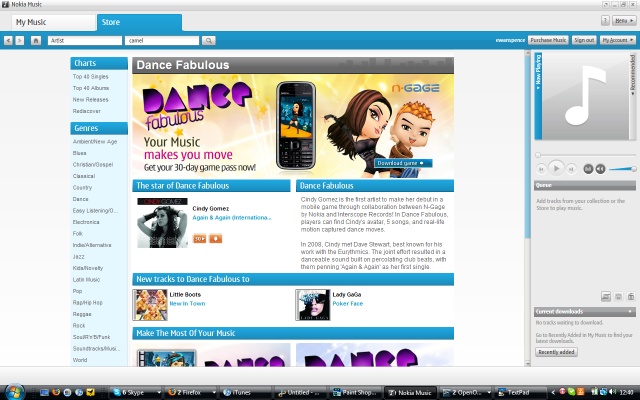For a long time, people pointed to devices like the iPod and claimed that they essentially promoted piracy because their capacity forced people to go and find millions of tracks online to fill up their new audio player. The appearance of online digital music stores, just as the digital audio players become must haves, meant that consumers did have a route to using up all the storage space, although at 50p-£1p per track it could be an expensive route (to say the least - Ed).
Nokia's major answer is, of course, the 'Comes with Music' service, which is part of the Nokia/Ovi Music store. This service allows you to download as much music as you like from the store and the cost is wrapped up in the initial purchase price of the phone (and there's always the possibility of a kickback from the monthly line 'rental', but I'll stress that's theoretical and nobody has said they are doing this with CwM) so to the user this service is simple... free music.
The realities of the music industry are as varied and troublesome as, well, the music industry. The biggest stumbling block in all this is that everyone feels the need to be paid fairly, and that has caused a lot of headaches for Nokia in setting up this service. There are still holes in the service (which I assume are contractual) and CwM is not available in every territory (America is a rather obvious gap).
But in this look at Comes with Music I'm not going to give Nokia any slack because of legal issues.
Why? They advertise it as “Unlimited downloads and millions of free tracks”. Consumers will not care about contracts and reasons for certain actions being prevented. They want something that works, with no compromise. That's what the mass market demands.
If you were to put on your strategy hat, then Comes with Music is probably the most progressive (legal) on-line music service out there. It's just unfortunate that the restrictions in place and the omissions from the catalogue make it feel a little bit... neutered.
The Service and DRM
Comes with Music is only available when you purchase a new phone – there is no way to get the service without buying a new device. I've been looking at the package from Orange here in the UK, who are supplying the service with the Nokia 5800 XpressMusic device. And now here's the first gotcha. You can only load music downloaded via Comes with Music to the specific Nokia 5800 that Orange supply to you. It won't go onto another 5800 (even if you switch the SIM cards), nor will it move to any other S60 device or Windows Media compatible player.
Given a user will have already paid for the service, and Orange would have them tied into a contract for the next 24 months (fyi, I'm using a PR-loaned device that goes back at the end of the week if you're wondering) I can't see any reason why another smartphone couldn't be “authorised” (iTunes-style) to accept the music. After all, Orange have the procedures to do so when they replace the handset under insurance.
If you're going to be using your computer to manage your music collection, then you'll need to be running a relatively up to date version of Windows. Mac and Linux users are limited to the client on the handset and no desktop support.
Of course, all this is down to DRM, the digital rights/restrictions management system used. I've argued that a well implemented DRM system which doesn't get in the way of the user will be acceptable in the marketplace. Guess what... the DRM in Comes with Music gets in the way of the user, not just in the fact that your music is tied to one specific PC (you can change it once every three months), and one specific phone, but it essentially means that tracks downloaded via Comes with Music are 'lesser music files' than those purchased singly through the same store.
It means that your media collection on your PC suddenly has different levels of “compatibility” depending on not just where you bought it, but under what 'flag'. The Nokia Music client can also pull down tracks from the Comes with Music service, or the same tracks, at 80p per track as a regular purchase – these tracks can moved to any Nokia Music phone, and burned to CD, but are still wrapped in DRM. It can also index the existing music on your PC, and there's a strong chance that these will be non-DRM'ed tracks that can be moved to absolutely anywhere, as many times as you want.
If you stay within simple boundaries, such as only using one service to buy your music, then it's not a problem, but the real world isn't like that, and the types of files will be rapidly mixed with no easy way to see what is what.
The PC Client
The Nokia Music software is a competent piece of code, which does the job well, but not brilliantly. It also could do with a refresh and a lot more user testing in the very near future. The one thing that consistently got to me was an insistence to always use a temporary playlist, “the queue”, to play tracks on my PC. Double click a track and it gets placed at the bottom of the queue and is immediately played; but in some cases when I double-click it's placed at the bottom of the queue but the current song continues to play. Various 'add to the queue and do stuff' options are available using alt-enter and ctrl-enter, but those are two handed operations (so moving my hand away from the mouse or trackpad, bad ergonomics, Nokia!) and also appear to be inconsistently applied, working on some areas of the screen but not in others.
User interfaces should be consistent. I'm just saying.
Oh yes, and I'd expect sorting to take account of the track numbers. When I click on sort by album, there doesn't seem to be a second 'sort option' that looks at the track number, like pretty much every other music player I have. It just looks poor to have out of sequence tracks after doing a sort. Steve points out that it's a problem with the Windows API that Windows Media gets around by using Microsoft hackery; so if Steve knows that, why doesn't Nokia? Or at least why do they not do something about it?
The PC client of course is the major gateway into the Music Store and the millions of tracks that are available to you... and this is where the fun really starts! Look, it's not like I've been trying to catch out the Music Store with difficult queries, but, after trying a few names, my thinking went from “let's download this” to “will it have this?” and then, shockingly, “will it have this and will it let me download it?”
Let's start with Eurovision ("must we?" - every AAS reader). It's the biggest live TV show on the planet (112 million viewers this year), it releases a worldwide compilation album of all the songs, and after my previous article, I knew it was in the store. But there's a problem...
Although there are 42 tracks, and they are all listed, I'm only allowed to download 25 of the tracks individually. The other 17 are only available if I decide to download the whole album.

Eurovision 2009 showing only some tracks available for download.
What is the point of that? Okay, it's not costing me anything extra to do that on the PC, but it eats bandwidth, it's awkward, and it's a pain in the neck for the end user.
It even took me a while to recognise I could grab the whole album to get all those tracks.
This isn't a unique problem, I found this discrepancy, in how you could or could not download tracks, to be everywhere in the first hour exploring the store. Bruce Springsteen's "Greetings From Asbury Park NJ" won't let you download it with one click, but each track is available individually, so you have to click 'em all to get the whole album.
I asked Steve to name a band. “Camel”, he said (look them up on Wikipedia, kids), and while they were in the store, their first album would not let you download the last closing track individually, just as part of the album.
It's just insane.

No problems in iTunes in buying tracks or albums.
The catalogue itself is not perfect – taking the discography of Status Quo and their classic album "Dog of Two Head". While released in 1971, it is actually marked up as being from 2008. This is of course a re-issue date from the Universal Music label, but is that as useful as the original year of the album? Not in my mind. There are also instances when bands with the same name are mixed together, such as Regina, who are either a rock band I rather like from Bosnia and Herzegovina or an electro-pop group band from Finland... who are labelled as being Christian Gospel. Is the fact that either of them aren't mainstream in the UK enough to ignore the database errors? Again, no.
You could easily argue through all these problems of download options, indexing and naming, that you get the track at the end of the process anyway, but that is not the point - if that was the case then every PC would still be running DOS. It stops the store being seamless, and makes for a much poorer user experience. I checked in the other popular store (iTunes), and these restrictions are not in place, you can buy tracks individually or do an album purchase. It's your choice.
Searching the Store is just as frustrating, because you only have the ability to search on Artist or Title. There are no extra filters that you can apply, such as searching in a specific year range. Neither is there a way to search in a specific genre. While the music store is split into sections (such as Blues, Soundtracks, Rock, Pop, etc), and each section has a front page of recommended tracks and albums you can buy, there's no easy way to search through the contents of each section, or use the search boxes to look in just that one section.
If you go browsing at all, you'll find lots of recommendations by the Music Store, and amazingly, all these recommendations seem to be driven by what the major labels want to sell that week. If you want to make a guess at what the number one single is going to be one week, see what the store recommends. Last week the single being pushed was Pixie Lott, and the album was Kasabian. Lo and behold, brand new entries at number one in the Top 40 singles and albums charts respectively.
Comes with Music is decidedly mainstream, and with the majority of content coming from the four major music labels that shouldn't be a surprise. Neither should the fact that these labels will have had major monetary concessions negotiated out of them from Nokia to be part of the service. Perhaps one of those was an agreement that they would have a hand in choosing the “tracks of the week” and other promotional spots in the store?
That's when Nokia aren't pushing the music used in Dance Fabulous on the N-Gage!

Cross promoting N-Gage and Nokia Music Store - Dance Fabulous.
(Just as an aside, if you purchase a track singly from the Nokia Music Store, it will count towards the sales for the UK Top 40. Because of the nature of Comes With Music, they're still working out the best way to count those downloads towards the weekly charts. I can't imagine the machiavellian glee the majors would have if they could count free downloads towards chart placings when the downloads happen to be right next to recommendations on that week's hot single... Cynical, moi?)
The catalogue is relatively comprehensive for mainstream artists, although I did spot some holes in the repertoire of older or long lived artists. Start to stray away from the populist line and you're in the realms of getting just the occasional Greatest Hits album from smaller performers, or just the occasional album. For all the size of the jazz section, there's only one Rufus Harley album. Seriously.
But I will give credit to the Music Store interface in some areas. It's very cleanly laid out and you can make sense of everything that's going on, be it in your collection or the online catalogue. You can step back through your clicks while exploring, like a trail of digital breadcrumbs, and this means that exploring what is available is fun, if a little haphazard.
If you feel the need, you can play and transfer all the downloaded music via Windows Media Player, and only use the Nokia Music app as a gateway to the store.
Conclusions
There is no doubt that Comes with Music is a huge undertaking, and Nokia should be applauded by the industry for getting the concept this far. Browsing music with the ability to just listen to it after a single click, with no worries about cost, is a great service for consumers. The principle is a sound one – have a pool of money that is then split up around all the partners in the program – but in practice it's not that simple to set up.
There are still issues that defy common sense, such as the limiting of the tracks to a single PC and smartphone at any one time, the haphazard ability to download tracks, and of course it still leaves the major record labels in control of the promotional channel and the lions share of the downloads. Although Comes with Music is apparently looking for independent labels to get on board, they will struggle to be found in current version of the store.
The music industry needs a more adult approach to the online digital world and how they handle the music for which they own the rights. By working with Nokia, it seems the major labels are accepting this, and while they are reducing the bottom line in terms of pure volume sales, do have an increase on the promotion and advertising of new acts on the other side of the debate.
When Comes with Music does work for the consumer, and to be clear this is probably about 99.5% of the time (i.e. one song has an issue in every seventeen albums or so), it works brilliantly. One click to grab the song, and then drag it over to the mobile phone. As long as they stay on that clear path, then Comes with Music is a winning product.
Problems will start to crop up for a user when they diverge, i.e. they buy another phone (Orange supply the 5800 on a two year contract), they get a new PC, or realise the tracks can't be burnt to CD as purchased iTunes tracks can... that's when the whole DRM system starts to fight against the user. Getting them around those road blocks will be vital in keeping the customer satisfied.
Would I recommend Comes with Music? Not directly. If you are in the market for a new phone, and you consume a lot of modern music, then it should be one of the options you consider. There is no silver lining to this cloud just yet, the service needs to mature a little bit more, and needs to be more robust to be the killer application that it has the potential to become.
Digital music online is growing up, and we've left the primary school fights and squabbles behind. The catch now is to navigate the tricky “sulky teenager” years that Comes with Music represents.
-- Ewan Spence, June 2009.
